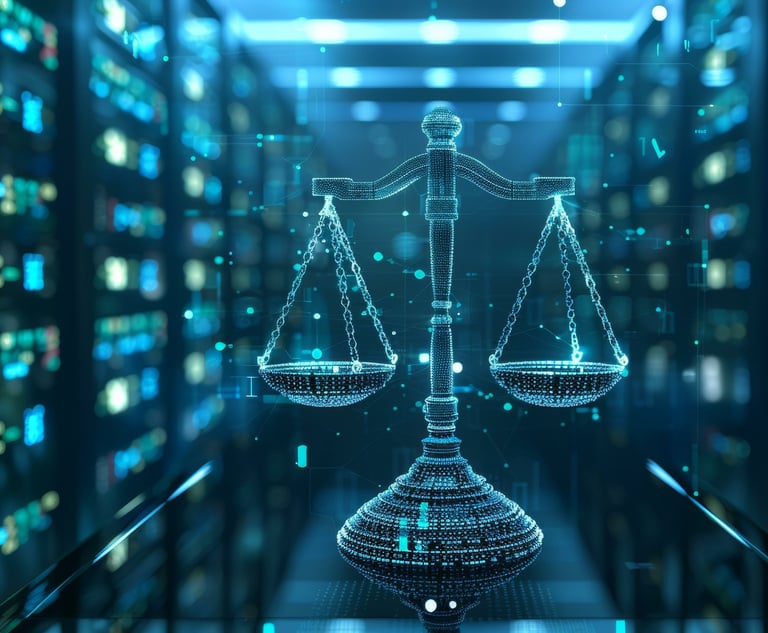 Credit: treety/Adobe Stock
Credit: treety/Adobe Stock Protecting Technology-Assisted Works and Inventions: Where Does Smart Technology End and AI Begin?
At what point does a "smart" computing system, or advanced software program, qualify as AI in the eyes of pertinent regulatory or judicial authorities? When is an individual considered to have merely deployed an AI-based computing tool to assist with creating a work of art or conceiving of a technological innovation? Each of these questions is explored in this article, giving consideration to currently prevailing guidelines from administrative bodies and the courts.
February 15, 2024 at 10:20 AM
11 minute read
What You Need to Know
- With the widespread adoption of AI technologies will come the need for companies and innovators to protect AI technologies under then-current intellectual property frameworks.
- Efforts to protect and enforce intellectual property on AI-based technologies are likely to be hampered by a lack of both a unified governing framework and a common understanding of the technology.
- These complex issues will probably be decided upon by courts, and subsequently the Federal Circuit or the Supreme Court.
The market potential for artificial intelligence (AI) technologies shows no signs of stopping in 2024, or in the not-so-distant future. According to Grand View Research, the global AI market size is expected to reach $1,811.75 billion by the year 2030, expanding at a compound annual growth rate (CAGR) of 37.3% from 2023 to 2024. See, "Artificial Intelligence Market to Reach $1,811.75 Billion by 2023," Grand View Research (June 2023). Giving rise to this projected market expansion are increasing investments in AI technologies, the demand for acquiring and processing big data, and the fundamental need to prepare for AI technologies" energy consumption. See, Rashi Maheshwari et al., "Top AI Statistics and Trends in 2024," Forbes (Jan. 2, 2024); see also, Zoe Kleinman et al., "Warning AI Industry Could Use as Much Energy as the Netherlands," BBC (Oct. 10, 2023).
It goes without saying that AI is going to greatly impact our businesses and our lives in a way only certain technological revolutions do. In a recent interview with an investment advisor, it was said that, on a scale of 0-100, with the harnessing of electricity being 100, AI is going to be a 95 in terms of industrial and cultural impact. With AI likely to become nearly as ubiquitous as a home utility, everyone, whether a layperson or service provider, will be required to use it to stay productive. See, Nathan Hager, "Bloomberg Daybreak Holiday Special – New Years Day 2024," Bloomberg Daybreak (Jan. 1, 2024).
This content has been archived. It is available through our partners, LexisNexis® and Bloomberg Law.
To view this content, please continue to their sites.
Not a Lexis Subscriber?
Subscribe Now
Not a Bloomberg Law Subscriber?
Subscribe Now
NOT FOR REPRINT
© 2025 ALM Global, LLC, All Rights Reserved. Request academic re-use from www.copyright.com. All other uses, submit a request to [email protected]. For more information visit Asset & Logo Licensing.
You Might Like
View All
‘Extremely Disturbing’: AI Firms Face Class Action by ‘Taskers’ Exposed to Traumatic Content
5 minute read

AI's Place in Big Law Broadens, As Firms Embrace Fresh Uses of the Technology

Law Firms Mentioned
Trending Stories
- 1Reviewing Judge Merchan's Unconditional Discharge
- 2With New Civil Jury Selection Rule, Litigants Should Carefully Weigh Waiver Risks
- 3Young Lawyers Become Old(er) Lawyers
- 4Caught In the In Between: A Legal Roadmap for the Sandwich Generation
- 5Top 10 Developments, Lessons, and Reminders of 2024
Who Got The Work
J. Brugh Lower of Gibbons has entered an appearance for industrial equipment supplier Devco Corporation in a pending trademark infringement lawsuit. The suit, accusing the defendant of selling knock-off Graco products, was filed Dec. 18 in New Jersey District Court by Rivkin Radler on behalf of Graco Inc. and Graco Minnesota. The case, assigned to U.S. District Judge Zahid N. Quraishi, is 3:24-cv-11294, Graco Inc. et al v. Devco Corporation.
Who Got The Work
Rebecca Maller-Stein and Kent A. Yalowitz of Arnold & Porter Kaye Scholer have entered their appearances for Hanaco Venture Capital and its executives, Lior Prosor and David Frankel, in a pending securities lawsuit. The action, filed on Dec. 24 in New York Southern District Court by Zell, Aron & Co. on behalf of Goldeneye Advisors, accuses the defendants of negligently and fraudulently managing the plaintiff's $1 million investment. The case, assigned to U.S. District Judge Vernon S. Broderick, is 1:24-cv-09918, Goldeneye Advisors, LLC v. Hanaco Venture Capital, Ltd. et al.
Who Got The Work
Attorneys from A&O Shearman has stepped in as defense counsel for Toronto-Dominion Bank and other defendants in a pending securities class action. The suit, filed Dec. 11 in New York Southern District Court by Bleichmar Fonti & Auld, accuses the defendants of concealing the bank's 'pervasive' deficiencies in regards to its compliance with the Bank Secrecy Act and the quality of its anti-money laundering controls. The case, assigned to U.S. District Judge Arun Subramanian, is 1:24-cv-09445, Gonzalez v. The Toronto-Dominion Bank et al.
Who Got The Work
Crown Castle International, a Pennsylvania company providing shared communications infrastructure, has turned to Luke D. Wolf of Gordon Rees Scully Mansukhani to fend off a pending breach-of-contract lawsuit. The court action, filed Nov. 25 in Michigan Eastern District Court by Hooper Hathaway PC on behalf of The Town Residences LLC, accuses Crown Castle of failing to transfer approximately $30,000 in utility payments from T-Mobile in breach of a roof-top lease and assignment agreement. The case, assigned to U.S. District Judge Susan K. Declercq, is 2:24-cv-13131, The Town Residences LLC v. T-Mobile US, Inc. et al.
Who Got The Work
Wilfred P. Coronato and Daniel M. Schwartz of McCarter & English have stepped in as defense counsel to Electrolux Home Products Inc. in a pending product liability lawsuit. The court action, filed Nov. 26 in New York Eastern District Court by Poulos Lopiccolo PC and Nagel Rice LLP on behalf of David Stern, alleges that the defendant's refrigerators’ drawers and shelving repeatedly break and fall apart within months after purchase. The case, assigned to U.S. District Judge Joan M. Azrack, is 2:24-cv-08204, Stern v. Electrolux Home Products, Inc.
Featured Firms
Law Offices of Gary Martin Hays & Associates, P.C.
(470) 294-1674
Law Offices of Mark E. Salomone
(857) 444-6468
Smith & Hassler
(713) 739-1250








